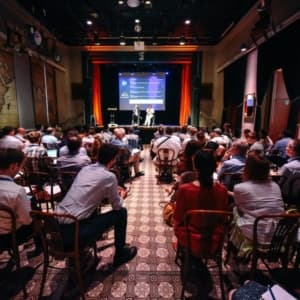2021-03-14 05:40
The technologies that change work and our lives. The digital that transforms our habits. Future of work, social protection and representation. This was the theme of the Summer Days held on June 26 and 27 in Brussels organised by CESI in collaboration with the Bertelsmann Stiftung.
 The event included a series of plenary meetings and parallel sessions coordinated by the Directorate General for Employment, Social Affairs and Inclusion of the European Commission, the European Foundation for the Improvement of Living and Working Conditions (Eurofound), the International Labor Organisation (ILO), the European Policy Center (EPC), the European Policy Studies Center (CEPS), CESI and CESI Youth.
The event included a series of plenary meetings and parallel sessions coordinated by the Directorate General for Employment, Social Affairs and Inclusion of the European Commission, the European Foundation for the Improvement of Living and Working Conditions (Eurofound), the International Labor Organisation (ILO), the European Policy Center (EPC), the European Policy Studies Center (CEPS), CESI and CESI Youth.
“As disruptions are the new norms, also trade unions will have to question the traditional interrelations of the industrial age”, said CESI Secretary-General Klaus Heeger.
The event also had a great participation of young workers, which are at the center of the discussion on the future of work. The importance of a union capable of renewing itself and of intercepting interests and difficulties and of including the prospects of young people stressed was repeatedly.
Given the fact that in particular the work on digital platforms is increasingly disconnected from time, place, colleagues, employees, trade unions and other communities, the classical structures and the interconnections of the industrial age and industrial relations will have to be stress tested. Reflection groups, trade unions, employers, platforms, civil societies and not least the young representatives discussed how to face the future of work by analysing the challenges and formulating proposals to ensure legal clarity, social protection and interest representation in the next future.
The issues addressed? Many – and all central to the future of work: Does the traditional dichotomy of employer/self-employed or employer/employee still apply to the conceptualisation of future forms of work? How useful is the definition of the term ‘worker’ in framing tripartite relations? Which new concepts and legal frameworks are needed to conceptualise new forms of work? Are traditional social protection schemes still adequate to ensure coverage of social security in the platform economy? Will traditional social partners remain the main institutions and will social dialogue and collective bargaining remain the main tools for guaranteeing interest representation for workers? How can the representation of interests, regardless of the actors, remain effective?
CESI Secretary-General Klaus Heeger stressed: “In order to remain relevant intermediaries, trade unions must also become the representative of workers in atypical forms of work. They may become the typical ones in the future. ‘Re-coupling’ workers will be key in order to ensure social protection, access to social rights and efficient interest representation.”
The event highlighted the importance of trade unions capable of facing change through a true dialogue which includes workers, researchers, experts, different social partners, institutions and the youth audience.
CESI President Romain Wolff spoke of the new forms of work in the context of the importance of including young people. “We have addressed the issue of the future of work and new forms of work. When we talk about this we absolutely have to include young people and it is important for the union to face change and readjust to what the new forms of work are. Trade unions need to face and address questions which will help workers find their traditional raison d’être in society and the economy.”
Two days of intense work at the Summer Days included the attention of CESI to the themes of work and of the worker, which must be brought back to the center of political discussions. Surely it will be necessary to work for a more dignifying and satisfactory social protection for all workers in any type of work. It is also important not to demonise flexibility per se, but instead, to fight for new and greater forms of protection within this new framework, CESI took away as a take-home message.



